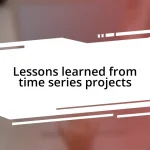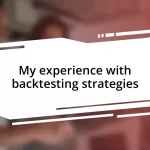Key takeaways:
- Scripting enhances clarity and confidence in communication, transforming chaotic ideas into structured expressions.
- Identifying the right scripts tailored to individual voice and audience increases engagement and effectiveness.
- Practicing and refining scripts through feedback and recordings leads to improved delivery and authenticity.
- Success is measured not just by technical precision but by audience connection and emotional impact.
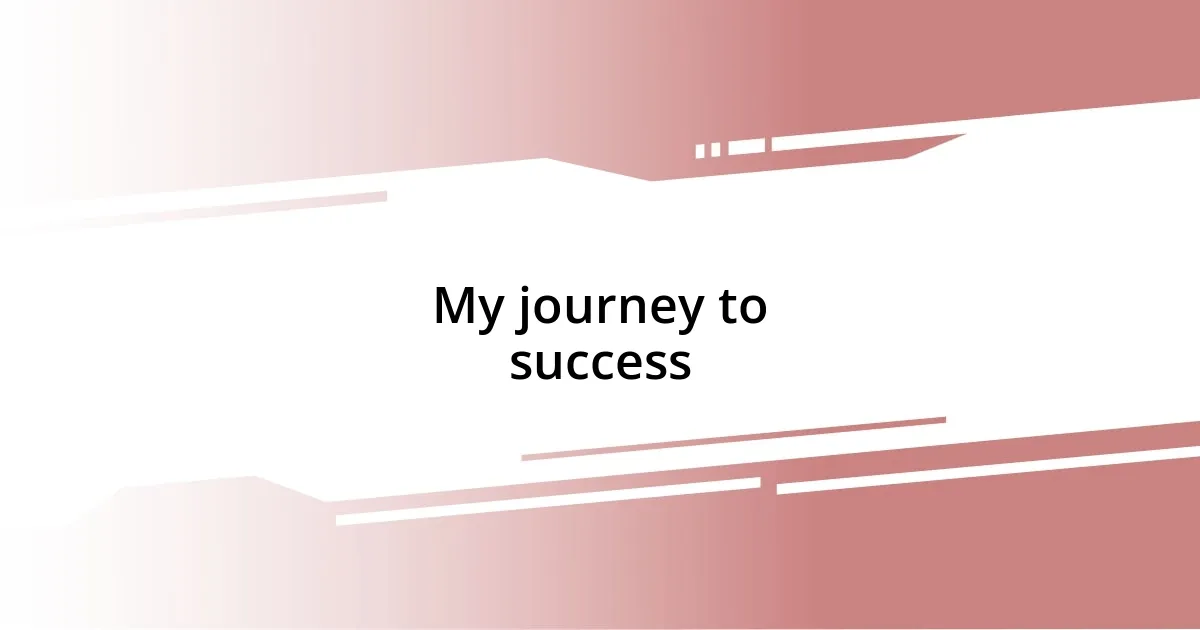
My journey to success
My journey to success has been anything but linear. I remember a time when I felt overwhelmed with the endless possibilities of what I could create, yet paralyzed by self-doubt. Have you ever found yourself frozen while trying to figure out the first step toward your dreams? That was me, until I stumbled upon the power of scripts.
One pivotal moment was when I decided to test the waters by writing a script for a presentation at work. Initially, I was skeptical—could these simple lines really convey my passion and ideas? To my surprise, not only did I feel more confident, but my colleagues responded with enthusiasm. That experience lit a spark in me; it showed me how structured communication could bring clarity to my thoughts.
As I embraced scripts more deeply, I discovered an enchanting blend of creativity and strategy. It was like having a roadmap that not only guided me but also opened up new avenues of exploration. How amazing is it to find a tool that complements both your artistic vision and logical thinking? In my case, scripts became the bridge between my chaotic ideas and the clear expression of what I wanted to achieve.
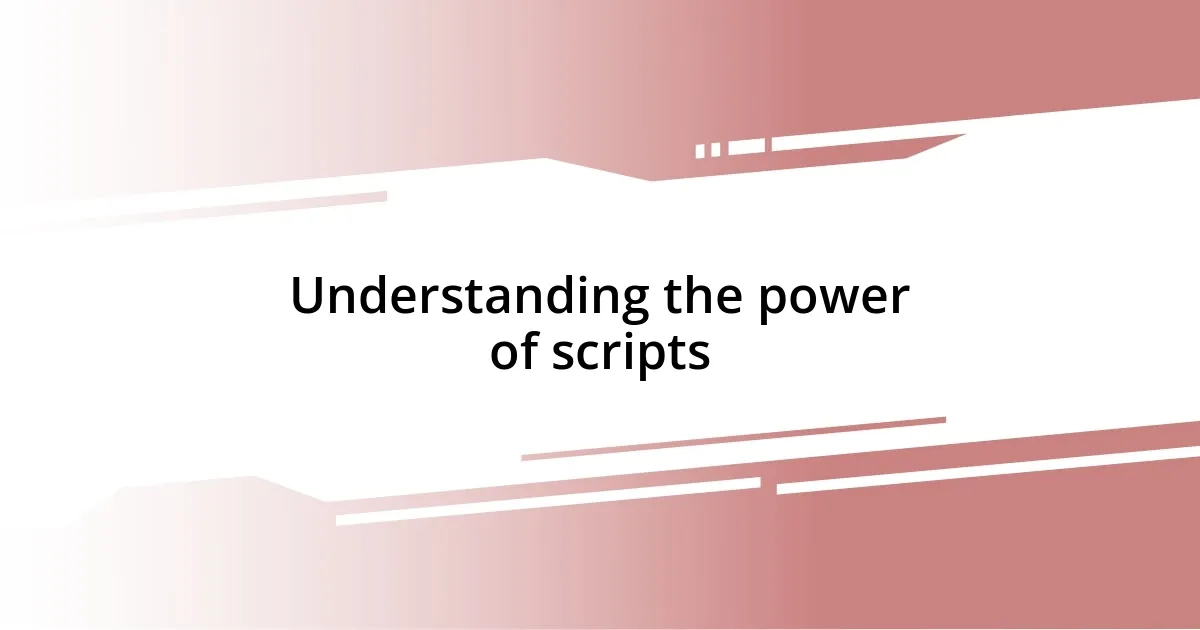
Understanding the power of scripts
Scripts hold incredible power in transforming ideas into coherent expressions. When I first stumbled into scripting, it felt like finding a key to a door I didn’t even know existed. I vividly remember drafting a simple dialogue for a video I was creating. The process was exhilarating! With each sentence I wrote, I felt my voice becoming clearer and more distinct. Understanding the foundation of what I wanted to communicate turned a mundane task into an adventure where creativity could flourish.
- Clarity and Focus: Scripting allows you to distill complex ideas into straightforward language.
- Confidence Boost: Knowing exactly what to say can significantly reduce anxiety during presentations or videos.
- Time Efficient: A well-crafted script often saves time during filming or speaking, ensuring you hit all your points without rambling.
- Creative Structure: It provides a framework that enhances creativity, giving you space to explore within boundaries.
The transformation from raw thoughts to a structured script was akin to finding my rhythm in a dance I once thought was too intricate. The more I iterated on my scripts, the more they became a reflection of my authentic self. It was liberating, challenging me not just to say what was easy, but to express what truly resonated with my heart. Each script became a stepping stone in my journey, helping me grow and refine my voice with every new project.
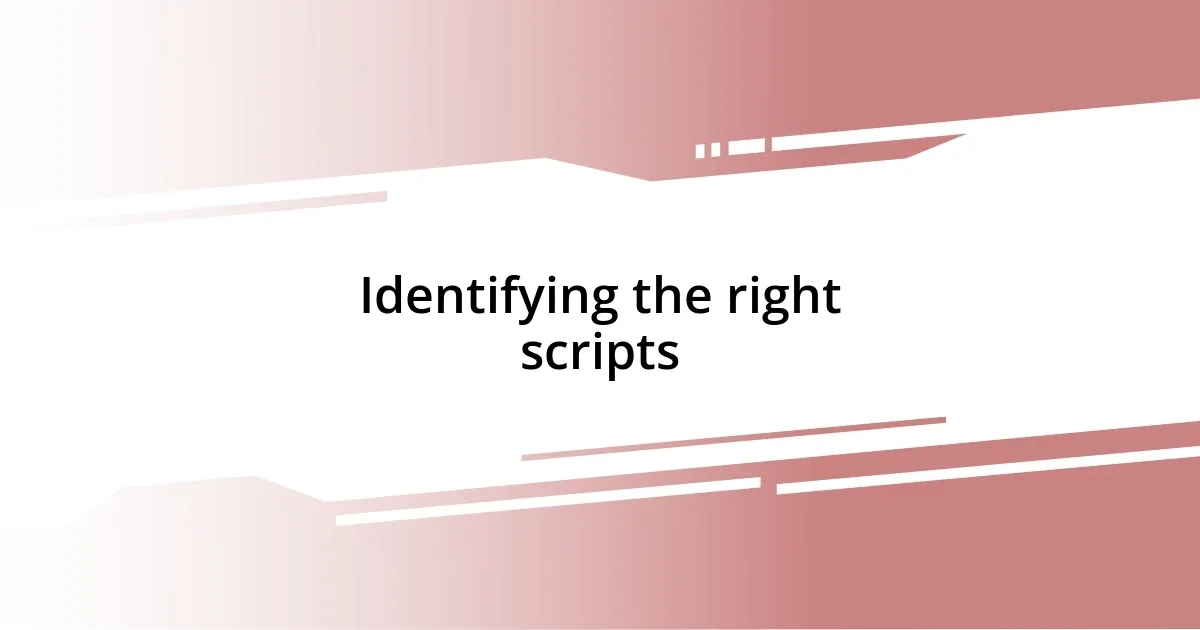
Identifying the right scripts
Identifying the right scripts is crucial to leveraging their potential effectively. I learned that not every script aligns with my voice or vision. For instance, while drafting a script for a marketing video, I initially used a template that didn’t resonate with me. It felt robotic and uninspired. That experience taught me to seek scripts that truly reflected my style—scripts that felt personal and engaging, transforming my delivery from mundane to memorable.
As I continued my journey, I discovered the importance of audience analysis. Knowing my audience’s preferences made it easier to tailor scripts that connected with them. I vividly remember crafting a script for a community event. By using relatable language and anecdotes, I sparked conversations and laughter, which turned an ordinary gathering into a vibrant exchange. Have you ever adjusted your approach based on the people around you? It’s enlightening how a few simple changes can create an impactful connection.
Lastly, gathering feedback has been a game-changer for identifying the right scripts. Some of the best insights I’ve received came from peers and mentors who pointed out strengths and areas for improvement. I recall the first time I shared a podcast script with friends. They provided invaluable feedback that helped refine my storytelling, making the content richer and more engaging. This collaborative approach not only improved my scripts, but made the creative process feel less isolating, fostering a sense of community.
| Criteria | Importance |
|---|---|
| Personal Connection | Creates authenticity and engagement |
| Audience Analysis | Facilitates tailored communication |
| Feedback Incorporation | Enhances script quality and collaboration |
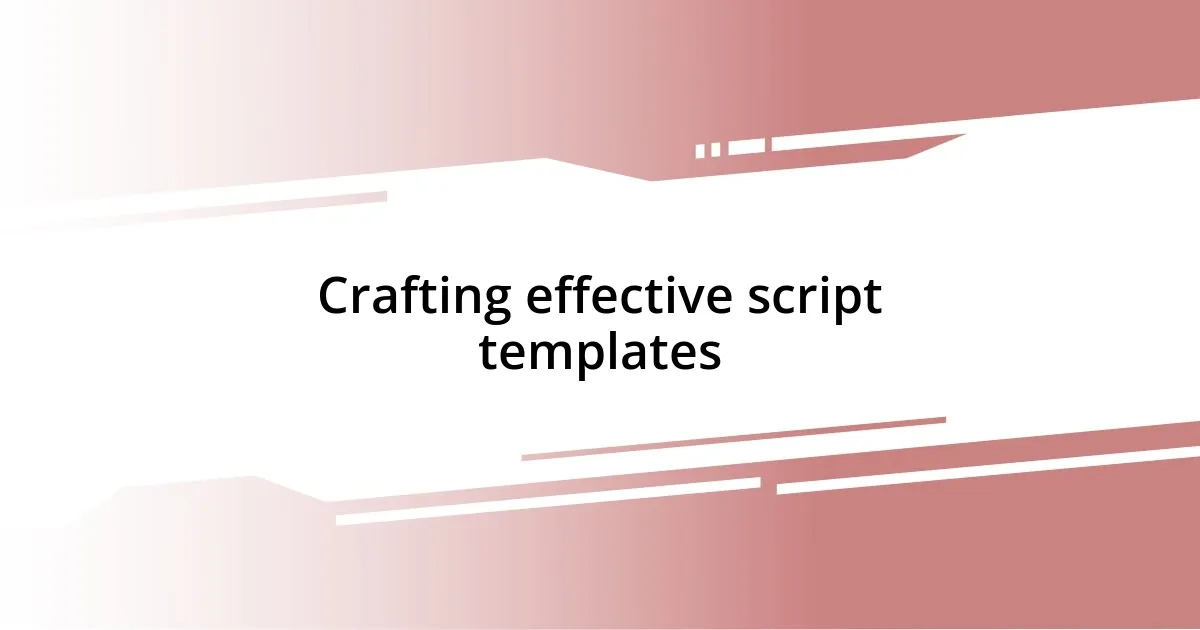
Crafting effective script templates
Crafting effective script templates begins with a clear understanding of your message. I remember the first time I mapped out a structure for a training video; it felt like drawing a roadmap for a journey. I divided it into sections: introduction, key points, and conclusion. This simple template not only provided clarity but also guided my creativity. What if I hadn’t done that? I would have likely lost my way amid the sea of ideas.
Next, I realized the power of brevity. In one project, I attempted to cram every detail into my script, thinking it would enhance its value. Instead, it left me floundering during my presentation. I learned that templates should encourage concise expressions. A bullet-point format often helps keep thoughts organized while allowing flexibility to expand on key ideas later. Have you ever found yourself overwhelmed by too much information? Sometimes, less truly is more.
Lastly, I found it beneficial to personalize each script template over time. Initially, I used generic phrases, but then I began injecting my own flair. For instance, I included favorite quotes that resonated with my audience, which not only made the script feel more engaging but also sparked connection. Remember, a script can be a template for others, but your unique voice is what will set it apart. What elements of your personality can you weave into your script structure? That’s where the magic happens.
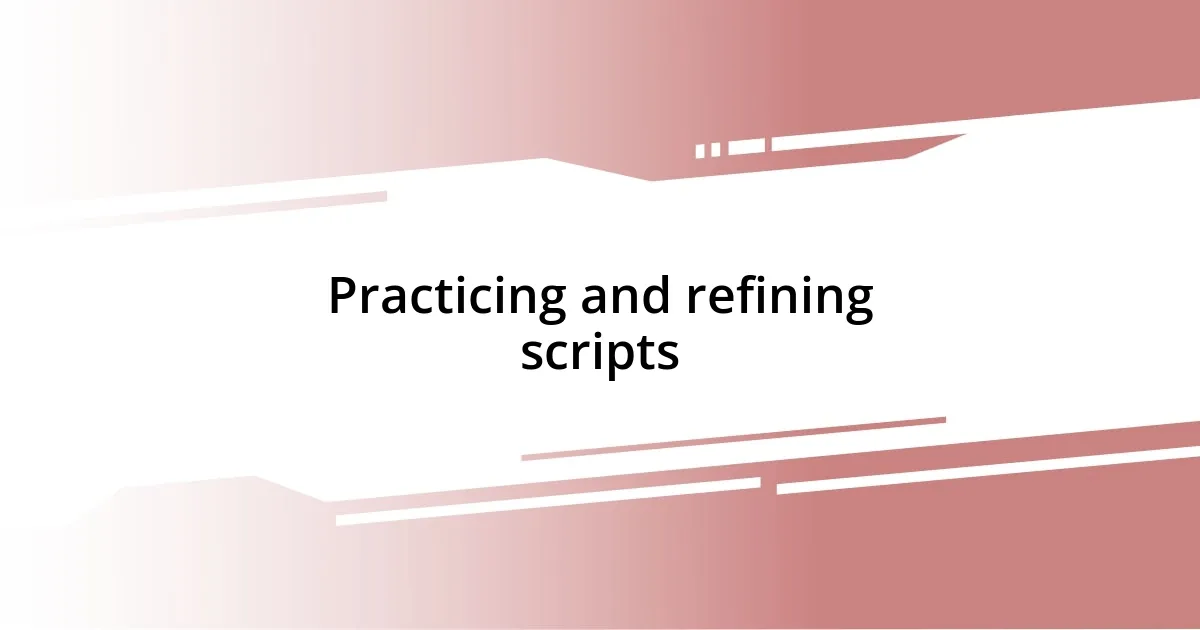
Practicing and refining scripts
Practicing and refining scripts is where the magic truly happens for me. I remember when I first started rehearsing my scripts out loud; it was a game-changer. Hearing my own words helped me spot awkward phrases that looked fine on paper but felt clunky when spoken. Have you ever practiced something only to realize it didn’t flow as well as you thought? That’s the moment when I began to appreciate the importance of vocal delivery and timing, as they can elevate a good script to something extraordinary.
As I dug deeper into refining my scripts, I discovered the value of feedback from live performances, not just written critiques. Once, during a presentation, I used a script that I thought was flawless. However, during the Q&A, a participant pointed out sections where I seemed to lose their interest. That feedback stung but also opened my eyes to how audience engagement can guide script adjustments. Have you ever felt a disconnect while presenting? Those moments are crucial learning opportunities that can reshape your approach and content.
Another strategy I adopted is recording myself. Listening to my own practice sessions revealed nuances I hadn’t noticed before, like pacing and emphasis. One memorable experience was when I recorded a pitch and realized I was speaking too quickly. Slowing down not only allowed my audience to digest the content better but also gave me room to convey my passion more effectively. Have you ever recorded yourself and been surprised by what you heard? It’s a brilliant way to refine your scripts, leading to a more authentic and confident delivery.
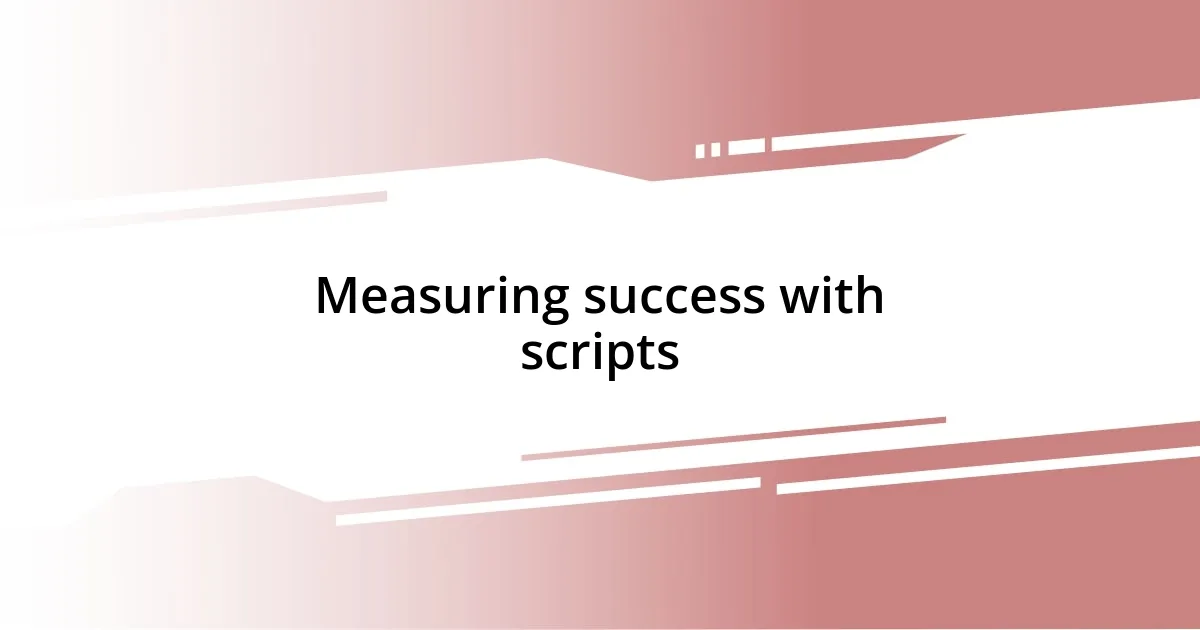
Measuring success with scripts
When it comes to measuring success with scripts, I often reflect on how my audience’s reactions serve as the most telling metrics. There was a time when I presented a workshop, and I could feel the energy in the room shift when I hit the right notes with my script. People leaned in, asked questions, and even shared their own stories. Isn’t that what we strive for? That genuine connection can often outweigh the technical perfection of our scripts.
Another key indicator of success I’ve come to rely on is the post-presentation feedback forms. I remember a pivotal moment when I received a mix of scores and comments that highlighted the impact of one specific section in my script. It was the storytelling element, where I shared a personal experience. This feedback not only validated my efforts but also helped me understand where to focus my future scripts. How often do we consider feedback as a vital tool for growth? It’s an essential part of crafting a more tailored approach.
I’ve also found success in tracking quantifiable outcomes, especially when I started using scripts for sales pitches. Early on, I would focus purely on the content, but one day, I decided to track conversion rates alongside script variations. The data showed that when I scripted personal anecdotes, my conversions spiked. This experience taught me that success can be measured in numbers, but it’s equally found in the emotional impact on my audience. Have you considered how your scripts resonate both quantitatively and qualitatively? Recognizing these layers of success truly enhances our journey as scriptwriters.
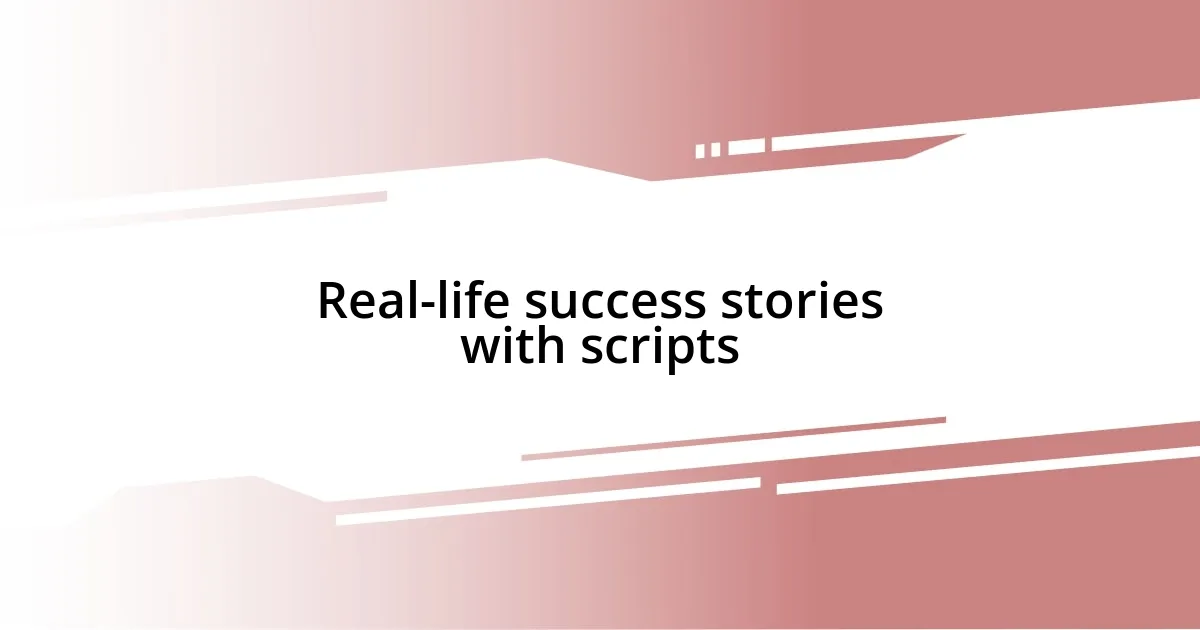
Real-life success stories with scripts
One standout moment for me was when I participated in a community event where I delivered a heartfelt speech using a script I’d painstakingly crafted. I vividly recall glancing out at the audience, and seeing tears in people’s eyes as I shared a vulnerable story about overcoming challenges. It struck me that this connection went beyond the words; it was about sharing an experience that resonated deeply. Have you ever felt that electric silence in a room filled with empathy? That’s the magic of using scripts to unlock authentic emotions.
In another instance, I joined a webinar series where I relied heavily on my scripts for each session. By keeping my points concise and relatable, I noticed an uptick in engagement—participants stayed on the call longer and contributed substantially more. Then came the unexpected email from a viewer who expressed how my scripted guidance helped them make a significant career shift. Has someone ever reached out to you, sharing how your words changed their path? It was a powerful reminder that our scripts can be vehicles for transformation, extending far beyond our immediate delivery.
I also remember a pitch meeting where I used a special analogy in my script that compared our product to a lifeboat in a stormy sea. The moment I delivered that line, I could see the interest from the stakeholders intensify. After the meeting, one investor approached me and confessed that the way I painted the picture made the decision to invest feel like a no-brainer. When was the last time you captured someone’s attention with a simple idea? It reaffirmed my belief in the persuasive power of well-crafted scripts, proving that sometimes, a metaphor can make all the difference.









